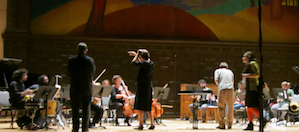
Photo by Margaret Cayward
Margaret Cayward, with a recent doctorate degree in music from UC Davis, specializing in ethnomusicology, reports from last week's biannual concert of the Composers and Improvisers Workshop at Mills College:
Fred Frith of Mills and Myra Melford of UC Berkeley led the workshop, exploring the art of improvisation. Frith de-emphasized solos, told students to "do less" and to "think about what they are doing."Seven graduate composers and 12 other musicians have collaborated in creating intricate sound tapestries, introducing individual pops of sound and modestly sustained notes in an amazing variety of timbres. Some pieces subtly incorporated audio-recordings, such as Christopher Luna’s sample of the vibration of a metal stop sign in his "Free way and stop sign."
Surprisingly coherent larger-scale patterns often emerged, including a lively triple-time march that concluded Ben Irwin’s arrangement of Stephen Dembski’s Sonotropism. Deft textural and formal craftsmanship was especially evident in Kimberly Sutton’s Timbre Studies: No. 5a.
Evelyn Davis’s Singing in a Crowd was entirely instrumental. Composer Ravi Kittappa spoke about the consistency in style between his From Nothing and his through-composed compositions. Jacob Peck intended in his Le Ode of Forgotten Bartholomew to let the "shared unconscious mind of the musicians" organize the performance, yet he was pleased that the musicians asserted their individuality. Mateo Lugo’s Distances-Togetherness (in Six Phases) also invoked the power of music to unify and transform.
Frith prepares his students to “give something up” and to accept “that the notes are enough.” His Color-coded exemplified “conducted improvisation” as four conductors crossed paths onstage, stressing music as motion while they cued specific groups of performers to respond to each other, shaping lovely sonic contrasts. The musicality embodied in this concert crossed conventional boundaries between the roles of composer and performer, individual and collective.

